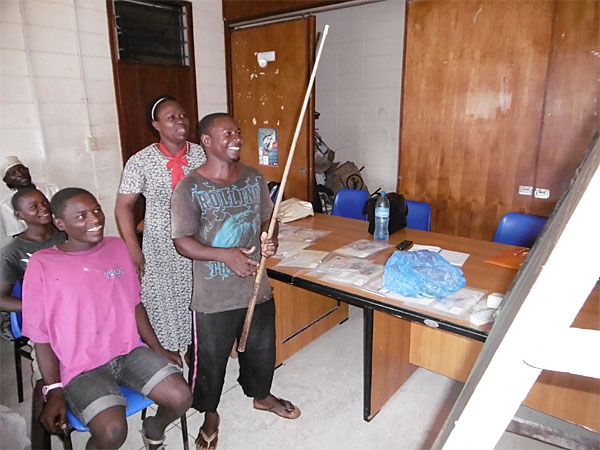There Is No Limit to Learning

In 2017 ATD Fourth World invited people around the world to document real-life “Stories of Change” starting from situations of injustice and exclusion caused by extreme poverty. These stories, from activists, community leaders, and others, show that when people work together, real change can happen. For more about the “Stories of Change” blog, click here.
Having missed out on education, Masudi discovers the joy of lifelong learning and encourages others to do the same.
By Masudi (Tanzania)
My name is Masudi. I come from Arusha, Meru, but today I live close to the fish market where I sometimes find work as a fisherman. I live in an area called “The Lebanon” with a group of other young people. A lot of them share a similar story to mine and were never able to keep up with their education.
My family situation meant that it was hard for me to finish school. It was too difficult for my mum to support us all financially. She had to raise us alone. I still wanted to learn, so I took a vocational training course to be a metal fabricator, but once again there was a shortfall of money. This is when I decided to leave Arusha for Dar es Salaam with the hope that life would be easier. I first arrived at Ubungo and then found my way to the fish market in search of money. There I came across some young people striving to make a life from what little they had.
After living here for a while, I met Issa Mfaume who encouraged me to go to the Literacy Class in the offices of the fish market. He is very committed to inviting all the people living close by to the market, and he even enrolled me for the class himself!
Going to class is very good for me because I could never really read or write, and this held me back from my dream. My dream is to write songs because I am a musician and I like to sing, but up until now I couldn’t read the words of a song, so it was more difficult for me to sing.
I try to attend all of the classes even though I have some difficulties with my eyes. They were damaged because of the dust produced when I was welding, as we didn’t have any protection. But it doesn’t matter, because I want to learn and I like it. So, what I do is I make sure that I sit as close to the blackboard as possible.
For others there are even more difficulties. I think of the young people who fish during the night and cannot come to class because they are tired and it’s too much of a strain. Take, for example, my friend Samuel. He tries, but he is too tired to follow what is going on. I try to remind my friends and I try to motivate them, but most of the young people here have to struggle every day. There is no choice. They have to go to work and because of this, they miss class.
The people that do come have become like family. We meet together, we share our stories, and we support whoever is beside us. If someone is not able to follow the class, or misses one day, or we see them giving up, we support them because we always try to progress together.
And this is what makes it so different from school. In school, I could never quite manage to catch up, but here I feel free, more responsible. It’s important to know how to read and write because we are fighting to overcome the obstacles in our path. I can feel myself becoming more open-minded.
My fellow students say it’s helpful for them in their daily struggles with work. Some say it gives them freedom. For example, when they have to go into town, it helps them to identify the names of places. All of us feel great joy in being able to go to the class, knowing that we are progressing, and seeing the world opening for us.
In our community, when you know how to read and write you feel more respected. You are recognized. Some of the people in our class say this is a relief because now they feel as much a part of the community as anyone.
And for those who haven’t come yet, who don’t dare to come, we say to you, “Join the group. There is no need to feel ashamed.”
When some people tell me that I am wasting my time with the class and should go to work instead, I tell them that there’s no age limit to learning, and that the most important thing is not to lose hope.

